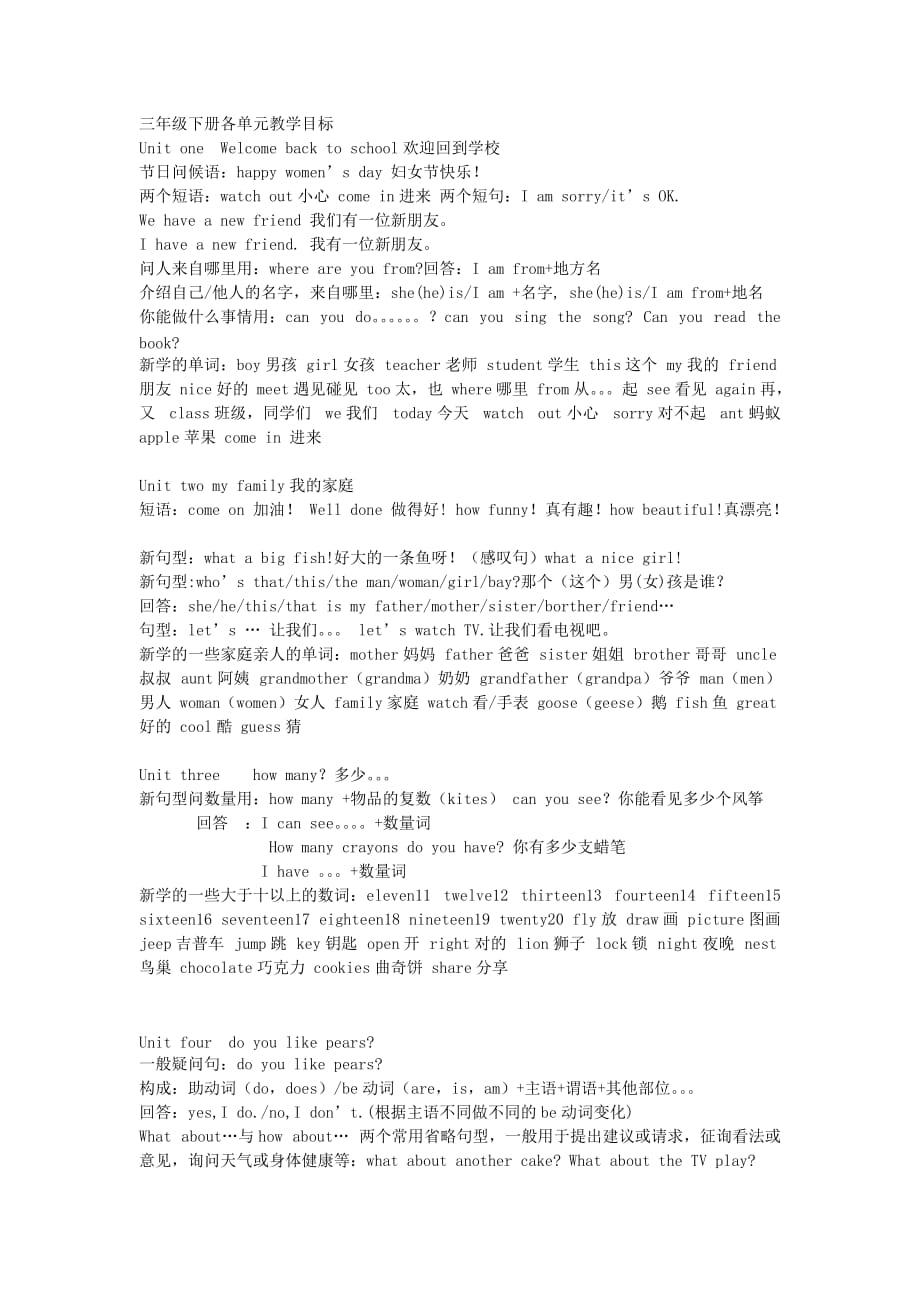《PEP小學(xué)英語(yǔ) 三年級(jí)下冊(cè)各單元教學(xué)目標(biāo)》由會(huì)員分享����,可在線(xiàn)閱讀,更多相關(guān)《PEP小學(xué)英語(yǔ) 三年級(jí)下冊(cè)各單元教學(xué)目標(biāo)(2頁(yè)珍藏版)》請(qǐng)?jiān)谘b配圖網(wǎng)上搜索��。
1�����、三年級(jí)下冊(cè)各單元教學(xué)目標(biāo)
Unit one Welcome back to school歡迎回到學(xué)校
節(jié)日問(wèn)候語(yǔ):happy women’s day 婦女節(jié)快樂(lè)��!
兩個(gè)短語(yǔ):watch out小心 come in進(jìn)來(lái) 兩個(gè)短句:I am sorry/it’s OK.
We have a new friend 我們有一位新朋友���。
I have a new friend. 我有一位新朋友�����。
問(wèn)人來(lái)自哪里用:where are you from?回答:I am from+地方名
介紹自己/他人的名字��,來(lái)自哪里:she(he)is/I am +名字, she(he)is/I am fr
2��、om+地名
你能做什么事情用:can you do�。。�。。����。。����?can you sing the song? Can you read the book?
新學(xué)的單詞:boy男孩 girl女孩 teacher老師 student學(xué)生 this這個(gè) my我的 friend朋友 nice好的 meet遇見(jiàn)碰見(jiàn) too太,也 where哪里 from從��。���。��。起 see看見(jiàn) again再���,又 class班級(jí)����,同學(xué)們 we我們 today今天 watch out小心 sorry對(duì)不起 ant螞蟻 apple蘋(píng)果 come in 進(jìn)來(lái)
Unit two my family我的家庭
短語(yǔ):com
3��、e on 加油��! Well done 做得好! how funny��!真有趣�!how beautiful!真漂亮�!
新句型:what a big fish!好大的一條魚(yú)呀!(感嘆句)what a nice girl!
新句型:who’s that/this/the man/woman/girl/bay?那個(gè)(這個(gè))男(女)孩是誰(shuí)����?
回答:she/he/this/that is my father/mother/sister/borther/friend…
句型:let’s … 讓我們。�����。���。 let’s watch TV.讓我們看電視吧��。
新學(xué)的一些家庭親人的單詞:mother媽媽 fa
4��、ther爸爸 sister姐姐 brother哥哥 uncle叔叔 aunt阿姨 grandmother(grandma)奶奶 grandfather(grandpa)爺爺 man(men)男人 woman(women)女人 family家庭 watch看/手表 goose(geese)鵝 fish魚(yú) great好的 cool酷 guess猜
Unit three how many��?多少�。。��。
新句型問(wèn)數(shù)量用:how many +物品的復(fù)數(shù)(kites) can you see�?你能看見(jiàn)多少個(gè)風(fēng)箏
回答 :I can see。��。�����。����。+數(shù)量詞
5、 How many crayons do you have? 你有多少支蠟筆
I have ��。�����。。+數(shù)量詞
新學(xué)的一些大于十以上的數(shù)詞:eleven11 twelve12 thirteen13 fourteen14 fifteen15 sixteen16 seventeen17 eighteen18 nineteen19 twenty20 fly放 draw畫(huà) picture圖畫(huà) jeep吉普車(chē) jump跳 key鑰匙 open開(kāi) right對(duì)的 lion獅子 lock鎖 night夜晚 nest鳥(niǎo)巢 chocolate巧克力 cookies曲奇餅
6�����、 share分享
Unit four do you like pears?
一般疑問(wèn)句:do you like pears?
構(gòu)成:助動(dòng)詞(do����,does)/be動(dòng)詞(are,is���,am)+主語(yǔ)+謂語(yǔ)+其他部位。��。����。
回答:yes,I do./no,I don’t.(根據(jù)主語(yǔ)不同做不同的be動(dòng)詞變化)
What about…與how about… 兩個(gè)常用省略句型,一般用于提出建議或請(qǐng)求�,征詢(xún)看法或意見(jiàn),詢(xún)問(wèn)天氣或身體健康等:what about another cake? What about the TV play?
學(xué)到的一些水果的單詞:peach桃 pear梨
7��、orange橙子 watermelon西瓜 apple蘋(píng)果 banana香蕉 grape葡萄 strawberry草莓
其他單詞:hungry餓的 please請(qǐng) taste品嘗 queen女王 quite安靜的 fruit水果 certainly當(dāng)然��,可以 more更多的 rainbow彩虹 rain雨 snake蛇 taxi出租車(chē)
Unit five where is my ruler?
幾個(gè)短語(yǔ):look out小心 no problem沒(méi)問(wèn)題 excuse me對(duì)不起 here you are給你
問(wèn)什么東西在哪里用:where is/are +物品 where i
8、s my eraser?
幾個(gè)介詞:in 在…里面 on 在…上面 under在…下面
學(xué)到的一些交通工具單詞:bus公車(chē) bike自行車(chē) taxi出租車(chē) jeep吉普車(chē) car小車(chē) plane飛機(jī) train火車(chē) ship船 subway地鐵
其他單詞desk課桌 table桌子 chair椅子 walkman隨身聽(tīng) lamp臺(tái)燈 zoo動(dòng)物園 play玩 toy玩具 umbrella傘 violin小提琴 vest背心 window窗戶(hù) wind風(fēng) use使用 fox狐貍 zebra斑馬
Unit six
句型:it has a long nose and a short
9�、 tail.
I have big eyes and small ears.
主語(yǔ)是第一人稱(chēng)I ,WE 第二人稱(chēng) YOU或者其他復(fù)數(shù)名詞時(shí)�,用have,表示“有。��。����。”
主語(yǔ)是第三人稱(chēng)she he it 或者表示單數(shù)的人或物時(shí)����,用has,表示“有。���。��?���!?
She has two pens��。 He has a basketball。
學(xué)到的一些形容詞:small小的 big大的 long長(zhǎng)的 short短的��,矮的 tall高的 lovely可愛(ài)的 cute逗人喜愛(ài)的
其他的單詞:deer鹿 giraffe長(zhǎng)頸鹿 feed喂養(yǎng) animal動(dòng)物 children兒童 tail尾巴
幾個(gè)簡(jiǎn)稱(chēng):UK 英國(guó) CAN加拿大 PRC中國(guó) USA美國(guó) A.M上午 P.M下午
 PEP小學(xué)英語(yǔ) 三年級(jí)下冊(cè)各單元教學(xué)目標(biāo)
PEP小學(xué)英語(yǔ) 三年級(jí)下冊(cè)各單元教學(xué)目標(biāo)

